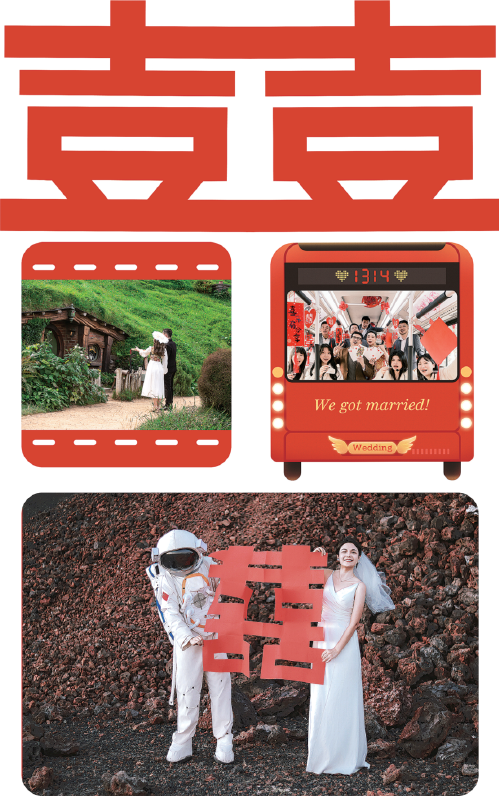Xu Lizhen (29 years old, China) was a bridesmaid for a friend and attended two other weddings, so she knows how complicated and expensive traditional weddings are.

So when she married Hou Naibin, 34, last year, she held a simple and relaxed ceremony in her husband's hometown of Yingkou, Liaoning province.
They did not hire professional makeup artists or fancy outfits. Instead, Hou wore a business suit and Xu a red dress provided by the wedding venue. During the ceremony, the couple shared a video of their journey to different cities across China in the six months since registering their marriage.
Particularly impressive is the photo series titled "Elope to Mars" at Wulanhada Volcanic Geopark in Inner Mongolia Autonomous Region, in which Hou is dressed as an astronaut and Xu is wearing a wedding dress.
"The wedding seemed simple but we put a lot of effort into preparing. This is a once-in-a-lifetime event so I didn't want to have a stereotypical wedding," she said.
According to Wang Yichen, 31, a wedding planner, more and more young people are choosing simple, light weddings.
With nine years of experience in the industry, Wang has planned nearly 300 weddings. Of the 20-30 weddings she coordinates each year now, 95 percent are simple and intimate.
Wang still remembers the first few years she worked as a wedding planner, when lavish parties were a must. The couple's friends usually made up only a small percentage, mostly relatives and family friends, often numbering several hundred people in total.
“Nowadays, the weddings we plan usually have about 100 guests, and many weddings only have about 50 guests,” Wang said. “A lot of young people like to turn their weddings into a reunion with old friends.”
Recently, 29-year-old bride Xiong Ying and 30-year-old groom Peng Zhegong added a little “spice” to their traditional wedding. In January, the couple in Wuhan, Hubei province, arrived at their wedding venue in a red-painted bus instead of the traditional luxury fleet.
"I was inspired by the wedding bus service shared by other couples on Xiaohongshu. After learning that Wuhan also offers a similar service, we decided to go for it," Xiong said. To date, the "wedding bus" topic has attracted more than 1.84 million views on China's lifestyle sharing platform Xiaohongshu.
In a traditional wedding, the groom and his family arrive at the bride's house early in the morning. Once there, they must pass a series of challenges set by the bridesmaids before they can meet the bride. This means that couples must quickly eat breakfast to arrive at the wedding venue at the predetermined "good hour".
However, with a wedding bus that can accommodate more than 20 people, door games can be held on the bus. On the way to the wedding venue, the couple and their young friends can also enjoy a fun and comfortable mobile party.
Wang said that a creative wedding today meets the "three no's" criteria: no escorts, no bridesmaids or groomsmen, and no witnesses. Other specific elements are omitted or not depending on the couple's preferences.
Niu Yajie, 26, and her husband both love the movie "Lord of the Rings" so instead of a traditional wedding, they traveled to New Zealand, where many scenes appear in the movie.
During their visit to the Hobbiton set, they recreated scenes depicting everyday activities from the films, such as cheesemaking and honey brewing.
While taking photos by a lake in Queenstown, New Zealand's South Island, a group of local youths were partying on a yacht on the lake. Seeing Niu and his wife taking wedding photos, they deliberately turned the yacht towards the couple, waved and loudly wished them a happy marriage. "Having such warm wishes overseas is a new experience," he said.
Traveling for a wedding is also a decision made after considering economic issues. According to Niu, a medium-sized wedding in Shanghai can cost up to 200,000 yuan (nearly 700 million VND). Even if guests give money as gifts, according to Niu, 80% of weddings receive red envelopes that are not enough to cover the cost of the ceremony. This is why the couple chose to allocate their wedding budget to personal experiences.
According to Wang, these changes in social attitudes are also reflected in the wedding industry. For example, more and more young people are embracing the concept of environmental sustainability. In the weddings Wang organizes, a large number of couples request that the flowers used for decoration be arranged in small bouquets and distributed to guests after the wedding, not thrown away.
People are also less likely to wish couples for childbirth and more toward happiness. For example, Zaoshengguizi (looking forward to the birth of a new baby) was once the most common wedding blessing, but it has become less common. "One bride I spoke to chose not to have children, so she was adamant about not receiving any zaoshengguizi-like blessings at the ceremony," Wang said.
The tradition of catching a bouquet also carries a different message than the traditional one. In the past, the person who caught the bouquet was wished to find an ideal partner, but now it is more simply to wish the recipient happiness.
At her wedding, Xiong threw a bunch of lettuce instead of a bouquet of flowers, because lettuce, or shengcai in Chinese, sounds like the word for "get rich." "When everyone was fighting over the lettuce, the atmosphere was very lively and joyful," Xiong said.
Even the definition of marriage is changing. Marriage used to be seen as the bride joining the groom's family. However, today, couples tend to see marriage as the union of two individuals, the formation of a new family.
Xu doesn't think marriage will make a difference in her life and might change the way the couple goes out, travels or watches movies. "We've always been compatible and trusted each other. The wedding is just the icing on the cake," she said.
TB (according to VnExpress)